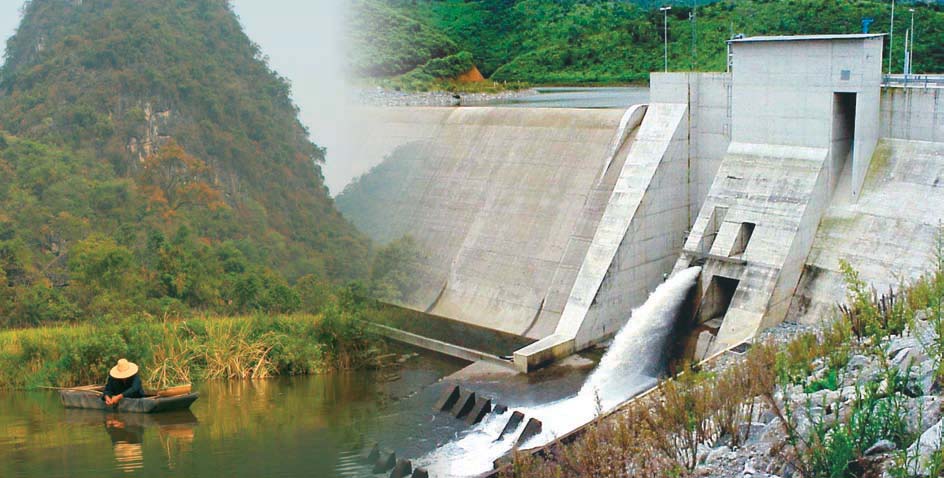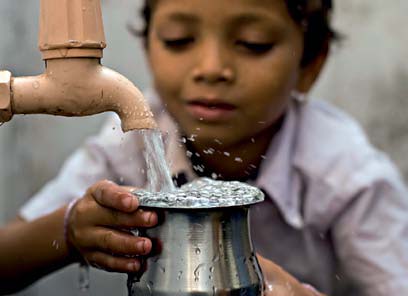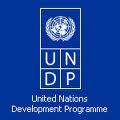/regions/india
India
Alternative national water policy - A critique - Economic and Political Weekly
Posted on 30 Oct, 2011 04:04 PMThis article published in the discussion section of the Economic and Political Weekly is a critique of the National Water Policy: An alternative draft for consideration, proposed by Ramaswamy Iyer, published in the Economic and Political Weekly, June 25th 2011.
Deciphering environmental flows - An article in Seminar magazine - Jayanta Bandyopadhyay
Posted on 30 Oct, 2011 10:45 AMAuthor: Jayanta Bandyopadhyay
This article published in the Seminar 626, October 2011 argues that our current state of knowledge of water systems and ecological modelling related to flows of water, which includes projecting a single quantitative figure of water requirements, is inadequate. Such a unilateral prescription of environmental flows or water requirements of aquatic systems as a method for the resolution of water conflicts may actually become the source of many new conflicts.
Sanitation in India: Progress, differentials, correlates and challenges – A report by ADB
Posted on 30 Oct, 2011 08:14 AMThis report by Asian Development Bank (ADB) deals with sanitation in India, in particular the progress, differentials, correlates, and challenges. Improved sanitation is essential to reduce ill health, child mortality, lost income associated with morbidity, and to improve environment, human dignity, and quality of life. Goal 7, target 3 of the Millennium Development Goals (MDGs) stipulates decreasing the proportion of population without sustainable access to basic sanitation by 50 per cent in the year 2015.
Environmental flows in water resources policies, plans, and projects - Case studies by IBRD
Posted on 29 Oct, 2011 06:34 PM This report comprising a set of case studies by International Bank for Reconstruction and Development (IBRD) presents how environmental flows is dealt with in water resources policies, plans, and projects. It focuses on the integration of environmental water allocation into integrated water resources management (IWRM) and so fills a major gap in knowledge on IWRM.
This report comprising a set of case studies by International Bank for Reconstruction and Development (IBRD) presents how environmental flows is dealt with in water resources policies, plans, and projects. It focuses on the integration of environmental water allocation into integrated water resources management (IWRM) and so fills a major gap in knowledge on IWRM.
Report of the committee on slum statistics/census - Ministry of Housing and Urban Poverty Alleviation
Posted on 29 Oct, 2011 04:12 PMThis report by the Ministry of Housing and Urban Poverty Alleviation, Government of India, is the outcome of the deliberations conducted by the committee on slum statistics/census constituted by the Ministry of Housing and Urban Poverty Alleviation in the context of the realisation that there continues
New hope for Indian food security? The System of Rice Intensification – A paper by International Institute for Environment and Development
Posted on 29 Oct, 2011 11:43 AMThis paper from the gatekeeper series of the International Institute for Environment and Development (IIED) describes the potential of an innovative rice cultivation practice-the system of rice intensification (SRI)—for allowing Indian rice farmers to not only enhance rice production and their net incomes, but also to solve the water crisis.
Towards drinking water security in India: Lessons from the field – A report by Water and Sanitation Program
Posted on 29 Oct, 2011 11:33 AM This report by the Water and Sanitation Program of the World Bank provides an account of the field level initiatives on drinking water security in India. The country faces many challenges in ensuring reliable, sustainable safe drinking water supply to rural households.
This report by the Water and Sanitation Program of the World Bank provides an account of the field level initiatives on drinking water security in India. The country faces many challenges in ensuring reliable, sustainable safe drinking water supply to rural households.
Though, in terms of provision of safe drinking water, more than 90 percent of the rural households have been covered, according to the NSSO 65th round survey 2008-09, much remains to be done to improve levels of service delivery, water quality and sustainability.
Ancient ingenuity in rainwater harvesting techniques | Anupam Mishra's legacy
Posted on 28 Oct, 2011 01:57 PMVideo Courtesy : The Water Channel
UNDP invites applications for Sustainable Development Prize 2012 – Apply by October 31, 2011
Posted on 28 Oct, 2011 01:08 PM 
United Nations Development Programme (UNDP) advocates for the Millennium Development Goals (MDGs), the concept of human development and the need to empower women. Its series of global, regional and country-focused Human Development Reports are a powerful advocacy tool with a focus on people-centered, inclusive, equitable and sustainable growth.
Performance of sewage treatment plants - Coliform reduction - Control of urban pollution series - CPCB (2008)
Posted on 27 Oct, 2011 12:38 PMThis report presents the findings of a study conducted by CPCB with the help of Indian Institute of Technology, Roorkee and Anna University, Chennai on the performa